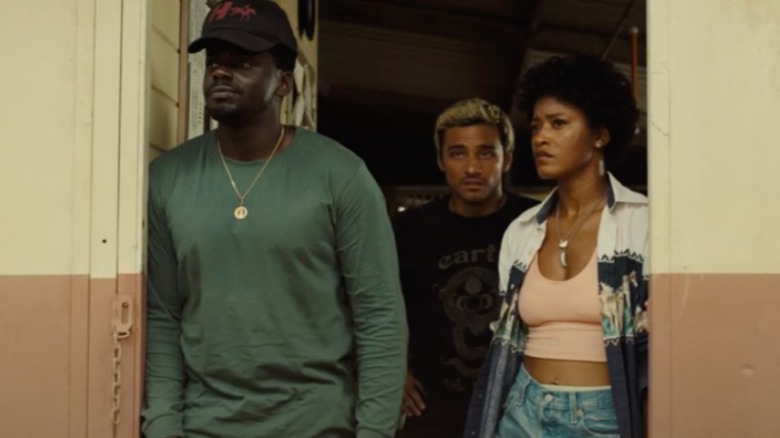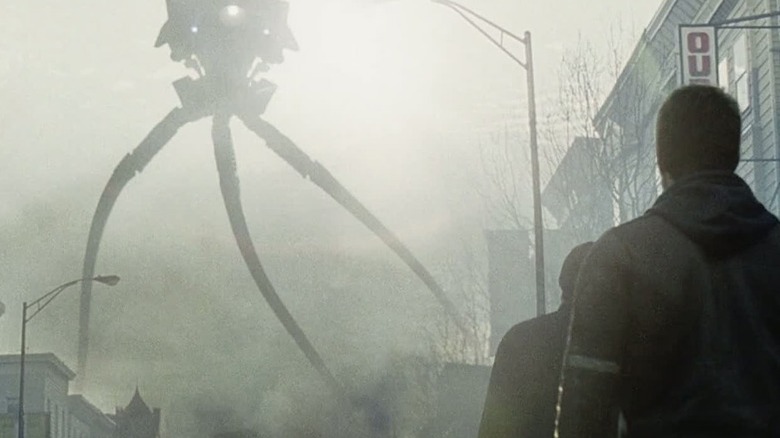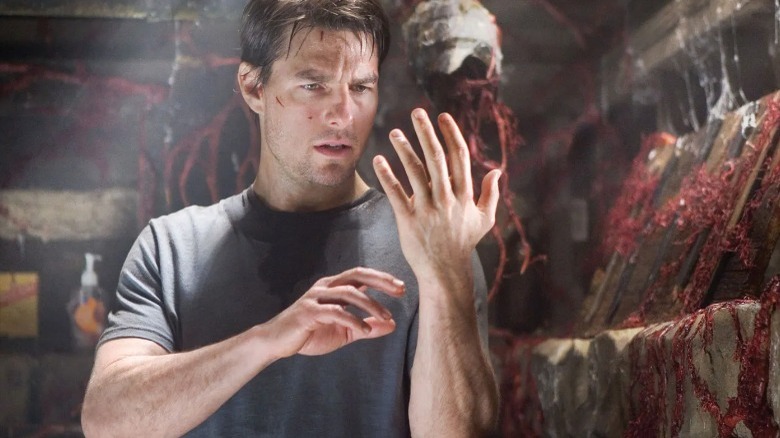Nope Has An Unlikely Connection To War Of The Worlds
The following article contains spoilers for "Nope."
Exactly one year after Jordan Peele released an inscrutable first poster image for "Nope" into the world, the world finally knows what "Nope" is all about. The filmmaker's third directorial feature hits theaters today, and by now, trailers have revealed that there's definitely something out of this world about the plot of the new movie.
The film follows ranchers and on-set animal wranglers Emerald (Keke Palmer) and OJ (Daniel Kaluuya), who begin to notice strange occurrences in the night sky over their home outside Hollywood. While promotional materials hinted at the presence of alien life forms, prominently featuring horses being lifted into the air and clouds with multi-colored flags sticking out of them, some of the coolest aspects of "Nope" were kept a secret for moviegoers. If you haven't seen the film yet, here's your chance to nope out of this article until you have, as there will be detailed spoilers ahead.
Alien mythology overlap
After building suspense and laying a groundwork of clues throughout its first half, "Nope" delivers an utterly unique take on alien mythology in its second. It's quiet, no-nonsense rancher OJ who finally makes the connection between the flying saucers the family has seen and the livestock they work with every day: it's not a ship, he says, it's an animal.
This clever twist brings some of the movie's more ambiguous earlier scenes into sharp focus: when coins and keys rained down on the family's ranch, those weren't mysterious alien debris, but the regurgitations of a living thing who couldn't digest the contents of its prey's pockets. Later, when the Haywoods purposely feed the entity something indigestible, it rains down blood, gore, and more debris over their house, vomiting up its earthly meal as if it has a case of food poisoning.
As ingenious and original as this take on alien life is, it brings to mind another 21st century alien flick: the polarizing Stephen Spielberg blockbuster "War of the Worlds." The 2005 film starring Tom Cruise has been alternately praised and maligned in the years since its release, considered either a lesser entry into Spielberg's filmography or an underrated thriller depending on who you ask. But buried between Dakota Fanning's screams and ample 9/11 imagery, there's one part of the movie that's still freaky as hell to this day: the alien harvesting process.
What if you're part of the food chain?
In "War of the Worlds," Spielberg, Josh Friedman, David Koepp's take on the H.G. Wells classic, mechanical, animal-like tripods initiate a hostile takeover of the earth. In the first days of their onslaught, they zap human beings into piles of gray ash, leaving only their clothes behind. Later, red tendrils begin to creep across the landscape. It's only after Cruise's Ray and Tim Robbin's Harlan speculate about the purpose of this terraforming that they see what's fueling the vegetation's blood-red color: the alien crafts are killing humans and using their blood and viscera as fertilizer for their new planet.
"War of the Worlds" isn't a perfect movie, but this is a pretty perfect bit of horror. Alien stories terrify in a way that other movies don't, because they foreground typically unexamined thoughts that can make a person feel dizzyingly small. Most human beings about their days assuming we're the rulers of the animal kingdom, because to give in to the idea that we could just be mealworms in the tank of some bigger creature — or raw ingredients for its DIY projects — destabilizes our entire sense of order. Cruise's eyes convey a pitch-perfect sense of existential terror when he understands the fine, red blood mist for the first time.
"Nope" captures that same destabilizing feeling, only instead of facing it with fear, the Haywood family faces it with a sense of responsibility and hard-earned confidence. As ranchers, the knowledge that the being terrorizing their family abides by biological patterns just like any other creature is helpful rather than unnerving. With this, Peele goes beyond the singular terror of a "War of the Worlds" moment, turning what could've been a surface-level twist into an impressive, character-driven piece of an extremely entertaining puzzle.


